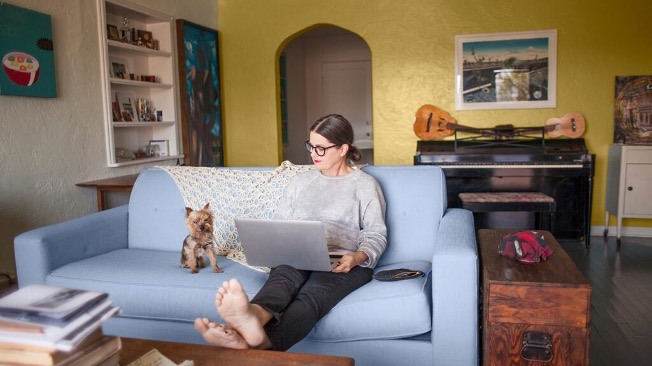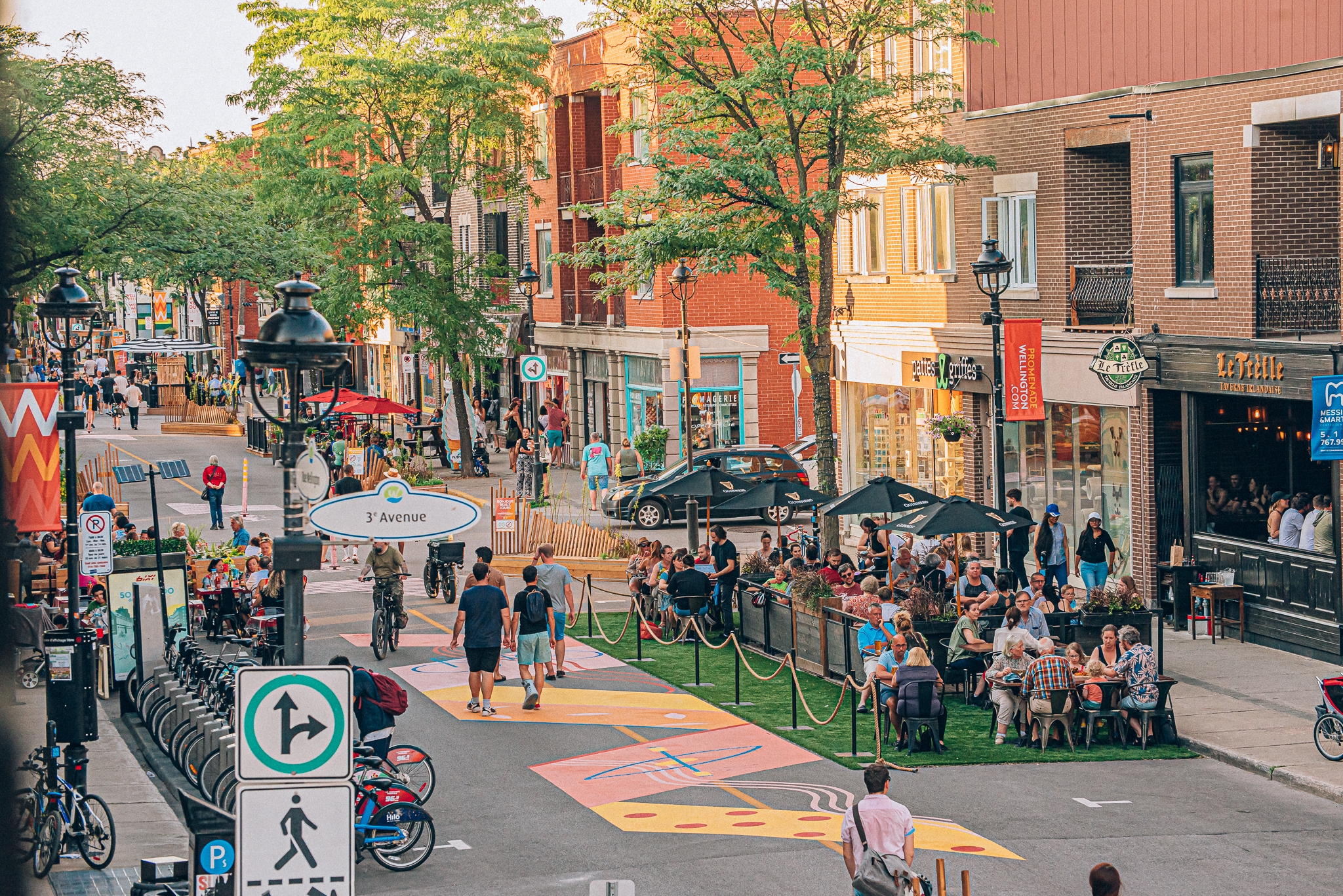on parle

Back to school, back to the Dispatch.
September 2022
Fall has officially arrived in Québec. With it comes the excitement of heading back to school, new seasons of our favourite TV shows, and a return to our daily routine. It’s a time when our consumption habits start to shift—sometimes we even grow a little wiser. But do Quebecers experience the fall season differently from the rest of Canada? In this dispatch, we explore some of Québec’s key differences in terms of lifestyle, inflation, the election cycle, and even religion. From advertising to communications to human interest stories, here’s what’s worth noting (in our humble opinion).

Living Alone: Comfort or Isolation?
Québec is different from the rest of Canada in a number of ways (for seasoned readers of our newsletter, this will come as no surprise!). One area that sets it apart is housing. According to Statistics Canada’s 2021 census data, Québec is the province with the highest number of people living alone or in common-law relationships.
Several factors have influenced this trend. Some are more empirical and measurable, like lower housing prices and high housing density in city centres. Others relate to Québec culture and its uniqueness.
In Québec’s cultural context, independence is seen as a value, which may inspire more people to choose to live alone. High levels of marital instability also play an important role in the choices made by Quebecers; 43% of Quebecers are in common-law unions—a huge number, especially when compared to the rest of Canada (i.e., not including Québec), where only 17% lives in common-law unions. The popularity of common-law relationships in Québec might be partly an outcome of the Quiet Revolution, a period of separation between Church and state that followed the conservatism of the “Grande Noirceur” period.
It’s also interesting to note that the proportion of young people living alone is on the rise.
The shift to more individual living in Québec is impacting both lifestyles and consumption habits. For instance, there’s less incentive to shop at Costco when you live alone, unless you plan to fill your cupboards for the entire year.
Like the rise of teleworking, the trend toward smaller or single-person households has major implications for advertisers: it requires adapting new products and services to an increasingly individual market, and segmenting communications in order to reach target audiences more effectively. The data should certainly be watched closely by advertisers, especially if these trends continue to grow.

Are Quebecers Optimistic Despite Inflation?
It should come as no surprise to hear that inflation has been on every Canadian’s mind since last January. According to recent surveys, however, Quebecers are experiencing inflation somewhat differently. In short, Quebecers feel less affected in their daily lives by inflation than people in other provinces, particularly when it comes to their ability to balance the budget and cover living expenses. Does this mean Quebecers are more optimistic, or less anxious?
To some degree, these attitudes could be viewed as characteristic of attitudes in la Belle Province. However, it’s important to consider a major factor: demographics. The majority of respondents who, thanks to their financial assets, feel comfortable meeting rising costs are adults aged 55 and up. The disproportionate size of the aging population obscures the fact that 18- to 34-year-olds are very concerned about their ability to maintain their standard of living amid the economic crisis.
Other factors, such as the increase in wages (which has been more pronounced in Québec than elsewhere, especially in the private sector) should be considered as well. Ultimately, Quebecers, like the rest of Canada, are still tightening their belts as they look for creative ways to maintain their lifestyle while building savings as best they can. Brands will have to adjust their approach to consumers to ensure that their messaging is sensitive to the financial strain that all generations are feeling. This will be a major challenge for the next while, or longer (depending on how optimistic you are!).

Voting for Laughter
Politics tend to be a serious matter—sometimes maybe a little too serious. As Québec’s provincial election race kicks into full swing, some political parties are resorting to humour to lure voters. Even Élections Québec is getting in on the fun, with a promotional campaign that spoofs traditional political messages.
Why the change in tone? The answer is obvious: humour works well in Québec. That’s why an account like “L'actualité en mèmes,” which mocks politicians, has more followers on Instagram (14,000+) than any political party other than Quebec Solidaire (42,000 followers), which has been using web humour to get its message across for years. This shows that advertisers hoping to break through in Québec would do well to take themselves a little less seriously—even if their message is in fact serious.
For advertisers in Québec and beyond, another consideration during election campaigns is that advertising messages could get drowned out in the sea of political ads flooding the media. Some savvy advertisers take advantage of this situation by creating parodies of political ads. This tactic is not without its risks, but done right, it can lead to powerful creative opportunities. It’s further proof that humour pays off in Québec, during election periods and the rest of the year.

The Pope’s Visit to Québec : Smaller Crowds Attend Mass Than Expected
The Pope’s visit to Canada in July proved to be a useful barometer of the piety of Quebecers. While the occasion drew significant crowds, turnout was low compared with places like Alberta, for example, where an estimated 64,000 worshippers gathered for mass.
The last time a pope visited Quebec City, in 1984, eight months of preparation and coordination with parishes were necessary to receive delegations from dioceses across eastern Québec. On that visit, the papal mass was attended by 300,000 people.
Part of the reason for the growing unpopularity of Catholic events stems from the strong grip the clergy formerly held on Quebecers’ lives. For many Quebecers, the Church is still synonymous with control and coercion. The Catholic religion also served as a major roadblock to independence. This legacy is one factor that sets Québec apart from the rest of Canada.
The decline of Catholicism in Québec is also undoubtedly one consequence of the Quiet Revolution, a period when believers began to question the authority religion exercised within the state. Since the 1980s, the desire for independence has intensified, and as part their efforts to move on from the past, Quebecers have quietly distanced themselves from the Church.
As a result, Québec is now one of the least religious provinces in Canada; today, the religion is surviving in Québec mainly thanks to newcomers. This decline manifests itself in different ways, particularly in rural areas. Less than five percent of Quebecers today identify as practising Catholics. As congregations continue shrink, the pews in many of Montreal’s 700 churches sit empty. Interestingly, rather than letting these houses of worship fall into disrepair or be demolished, some Montreal developers are transforming the buildings into attractive housing imbued with history—and cachet.
Since the province’s history is so intertwined with the Catholic Church, it is impossible to reflect on Quebecers’ current attitudes toward Catholicism without considering the past. Quebecers are proud of their independence, proud to have resisted the American cultural invasion, and proud that they’ve developed a distinct identity and society.
While Catholicism no longer has much of a practical role in Quebecers’ daily lives, it nevertheless colours our history, persisting in the names of streets and cities, in expressions and profanities, and in holidays. And while the religion is practised less and less, in their values Quebecers remain essentially Judeo-Christian.

The world's coolest street is in Montreal
Time Out recently released its famous annual list of the coolest streets in the world, and Verdun took home the gold medal this year, with the borough’s exhilerating Rue Wellington at the top of the list. Going pedestrian-only in the summer and with an array of shops and restaurants to explore, Wellington has countless charms for locals and visitors alike. Hot spots include Bar Palco, which offers its “5@Huîtres” buck-a-shuck special during happy hour: the perfect opportunity to savour a few oysters (or few dozen) over a drink with colleagues. It’s official: Rue Wellington is a must-visit street that simply could not be cooler.

The return of fall TV shows: a chance to see the Québec star system at work
September marks the return of fall television programming, which means it’s a great opportunity to learn more about Québec’s star system. Once again this year, in collaboration with our partner Jungle Media, we’re sharing five new shows (all original Quebec productions) that are worth watching on the small screen (or any screen of your choice) in the coming weeks.
Radio-Canada Ici Télé:
STAT: A new show that replaces the legendary District 31, STAT is an intimate look at the daily lives of staff at Hôpital St Vincent in Montreal. We meet four friends who hold very different positions at the hospital. The group (played by Suzanne Clément, Patrick Labbé, Geneviève Schmidt and Stéphane Rousseau) is still dealing with the loss of François, Emmanuelle’s lover, who died the previous year under hazy circumstances. This core group of friends is surrounded with a cast of characters who interact as they run the hospital’s different departments.
MONDAY THROUGH THURSDAY, 7 P.M.
POUR TOI FLORA: This series is the first to bring the painful legacy of residential schools in Québec to the screen. Pour toi Flora tells the fictional story of two young Anishinaabe who are trying to make peace with the past.
TUESDAY, 8 P.M.
TVA:
INDÉFENDABLE: A new show starring Sébastien Delorme that takes over the time slot held for years by Radio-Canada. An engaging and captivating new legal series with broad appeal, Indéfendable delves into the world of the criminal defense firm Lapointe-Macdonald, offering a realistic universe shaped by human drama.
MONDAY TRHOUGH THURSDAY, 7 P.M.
ANNA ET ARNAUD: Following a serious trauma at age 20, Arnaud (Nico Racicot) loses his direction, along with his hopes and dreams, finding himself on the street where happiness is sold by the gram. His mother, Anna (Guylaine Tremblay), a talented seamstress for a figure skating club, attempts the impossible: to rescue her son from the cold streets and the fog of drugs.
TUESDAY, 8 P.M.
Noovo:
UNE AFFAIRE CRIMINELLE: The fates of Catherine Godin (Céline Bonnier) and major crimes investigator Benoît “Bing” Inglis (Louis-Philippe Dandenault) intertwine when they are questioned by investigators from the Independent Investigation Bureau about events that have taken place in Saint-Bruno over the past 15 years.
TUESDAY, 8 P.M.
The race for top viewership numbers is already heating up as Quebecers seize the chance to connect with their favourite stars. Be sure to tune in, or set your recorders, so you don’t miss out on these new releases.
